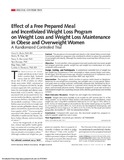Effect of a Free Prepared Meal and Incentivized Weight Loss Program on Weight Loss and Weight Loss Maintenance in Obese and Overweight WomenA Randomized Controlled Trial

View/
Date
2010Author
Flatt, SW
Sherwood, NE
Karanja, N
L. Rock, ,
Shirley, W
Bilge, Pakiz
Cynthia, A. Thomson
Type
ArticleLanguage
enMetadata
Show full item recordAbstract
Context ; The prevalence of overweight and obesity in the United States remains high. Commercial weight loss programs may contribute to efforts to reduce the prevalence of overweight and obesity, although few studies have examined their efficacy in controlled trials.
Objective ; To test whether a free prepared meal and incentivized structured weight loss program promotes greater weight loss and weight loss maintenance at 2 years compared with usual care.
Design;, Setting, and Participants A randomized controlled trial of weight loss and weight loss maintenance in 442 overweight or obese women (body mass index, 25-40) aged 18 to 69 years (mean age, 44 years) conducted at US institutions over 2 years with follow-up between November 2007 and April 2010.
Intervention The program, which involves in-person center-based or telephone-based one-to-one weight loss counseling, was available over a 2-year period. Behavioral goals were an energy-reduced, nutritionally adequate diet, facilitated by the inclusion of prepackaged food items in a planned menu during the initial weight loss phase, and increased physical activity. Participants assigned to usual care received 2 individualized weight loss counseling sessions with a dietetics professional and monthly contacts.
Main Outcome Measures Weight loss and weight loss maintenance.
Results Weight data were available at 24 months for 407 women (92.1% of the study sample). In an intent-to-treat analysis with baseline value substitution, mean weight loss was 7.4 kg (95% confidence interval [CI], 6.1-8.7 kg) or 7.9% (95% CI, 6.5%-9.3%) of initial weight at 24 months for the center-based group, 6.2 kg (95% CI, 4.9-7.6 kg) or 6.8% (95% CI, 5.2%-8.4%) for the telephone-based group, and 2.0 kg (95% CI, 0.6-3.3 kg) or 2.1% (95% CI, 0.7%-3.5%) for the usual care control group after 24 months (P < .001 for intervention effect).
Conclusion; Compared with usual care, this structured weight loss program resulted in greater weight loss over 2 years.
Trial Registration ; clinicaltrials.gov Identifier: NCT00640900
The prevalence of overweight and obesity in the United States remains high. National survey data for 2007-2008 indicate that 33.8% of adults are obese (body mass index [BMI; calculated as weight in kilograms divided by height in meters squared] ≥30), and the prevalence for overweight and obesity combined (BMI ≥25) is 68.0%.1 Obesity is associated with an increased risk for numerous medical problems, especially hypertension, diabetes, dyslipidemia, and the metabolic syndrome.2 Other comorbidities associated with overweight and obesity include gallbladder disease, sleep apnea, osteoarthritis, hyperuricemia, and lower quality of life.3- 5 Excess mortality associated with obesity is primarily attributable to cardiovascular disease, diabetes, kidney disease, and several types of cancer.6- 7
Given the magnitude of the problem, clinical and public health guidelines recommend screening and prescribing treatment programs for those who are already overweight or obese.8- 9 Although commercial weight loss programs are popular, there is a paucity of scientific evidence on which to judge their efficacy.10 Only a few studies10- 12 suggest that some programs have the potential to promote a degree of weight loss that equals or exceeds office-based counseling or medical interventions.
The first aim of this study was to test in a randomized controlled trial whether participation in a free prepared meal and incentivized center-based or telephone-based intervention promotes greater weight loss and weight loss maintenance at 2 years in overweight or obese women compared with usual care. A secondary aim of the study was to describe the effect of participating in the program (vs usual care) on selected biochemical factors, cardiopulmonary fitness, quality of life, and eating attitudes and behaviors. Biochemical factors under study include plasma lipids (fasting levels of total cholesterol and triglycerides, low-density lipoprotein cholesterol, and high-density lipoprotein cholesterol), C-reactive protein (CRP), and plasma carotenoids, a biomarker of intake of fruits and vegetables.
URI
http://jama.jamanetwork.com/article.aspx?articleid=186793http://erepository.uonbi.ac.ke:8080/xmlui/handle/123456789/50866
Citation
Rock, C. L., Flatt, S. W., Sherwood, N. E., Karanja, N., Pakiz, B., & Thomson, C. A. (2010). Effect of a free prepared meal and incentivized weight loss program on weight loss and weight loss maintenance in obese and overweight women. JAMA: The Journal of the American Medical Association, 304(16), 1803-1810.Publisher
University of Nairobi, college of agriculture and veterinary services,
